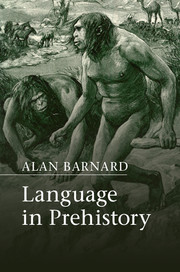Book contents
- Frontmatter
- Dedication
- Contents
- List of figures
- List of tables
- Preface
- 1 Introduction
- 2 Population diversity and language diversity
- 3 What did prehistoric people do?
- 4 How did prehistoric people think?
- 5 Narratives of the every-day
- 6 Mythological narratives
- 7 Sexual selection and language evolution
- 8 Conclusions and thoughts for the future
- Glossary
- References
- Index
3 - What did prehistoric people do?
Published online by Cambridge University Press: 05 November 2015
- Frontmatter
- Dedication
- Contents
- List of figures
- List of tables
- Preface
- 1 Introduction
- 2 Population diversity and language diversity
- 3 What did prehistoric people do?
- 4 How did prehistoric people think?
- 5 Narratives of the every-day
- 6 Mythological narratives
- 7 Sexual selection and language evolution
- 8 Conclusions and thoughts for the future
- Glossary
- References
- Index
Summary
This may seem pretty obvious. Hunters hunt, and gatherers gather. The reality is, of course, slightly more complicated. The ecology of hunter-gatherer societies is related to social phenomena, such as land use, land ownership, perceptions of nature (through language) and so on. Knowing this provides necessary background for understanding how hunter-gatherers perceive the world. This will be the subject of the following chapter.
Hunter-gatherer society: an eighteenth-century invention?
A few years ago I argued that hunter-gatherer society was an eighteenth-century Scottish invention (Barnard 2004a). The concept of ‘hunter-gatherer society’ simply did not exist before that. This is not to say that seventeenth-century Europeans did not understand what it meant to be an individual hunter-gatherer, but it is to say that they could not conceive of hunter-gatherers as living in a society. In the seventeenth century, the idea of society was not generally expressed as a count noun, as we do today: one society, two societies, etc. It was expressed in the abstract, with no indefinite article: in society. What is more, hunter-gatherers were understood to be people who lived beyond society, and not within it. The hunter-gatherer, therefore, was a society-less person:
In such condition, there is no place for Industry, because the fruit thereof is uncertain: and consequently no Culture of the Earth; no Navigation, nor use of the commodities that may be imported by Sea; no commodious Building; no Instruments of moving, and removing such things as require much force; no Knowledge of the face of the Earth; no account of Time; no Arts; no Letters; no Society; and which is worst of all, continuall feare, and danger of violent death; And the life of man, solitary, poore, nasty, brutish, and short (Hobbes 1991 [1651]: 89).
In the eighteenth century some writers, notably Rousseau (1973 [1750–62]), preferred to idealize the individual hunter-gatherer. This, however, had less to do with the acceptance of a hunter-gatherer lifestyle as sociable: Rousseau held that humans were naturally not sociable. It had more to do with perceiving the economic basis of society. Rousseau was, if you like, the first ‘Marxist’. Later writers, notably Adam Smith, went further. Smith was indeed among the very first to see hunter-gatherers not only as sociable but also as possessing society.
- Type
- Chapter
- Information
- Language in Prehistory , pp. 33 - 50Publisher: Cambridge University PressPrint publication year: 2016



